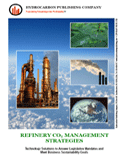
Technology Solutions to Reduce Carbon Footprint and Meet Business Sustainability Goals.
Conclusion of the latest UN climate change meeting in Cancun, Mexico in Dec. 2009 has not resolved the confusion over new and pending greenhouse gas emissions laws for the global refining industry. Over the long term, oil companies are forced to change course, but which path should a refiner take?
Our very timely multi-client strategic report, Refinery CO2 Management Strategies, is the most comprehensive study offering in-depth and insightful analyses of the latest technologies and the economic benefits of solutions to reduce carbon footprint in refinery operations. To help refiners prepare and formulate the right strategies, the Report examines three principal strategies—decreasing carbon intensity, lowering energy intensity, and carbon capture and sequestration (CCS).
Recent legislative and market measures could have big impacts on refiners around the world. In the US, the Environmental Protection Agency (EPA) announced on Dec. 23, 2010 to limit GHG emissions from refineries. The EPA will propose performance standards in Dec. 2011 and issue final standards in Nov. 2012. Just a week before the EPA's declaration, California regulators approved the state's 2006 climate bill, known as AB 32, which calls for a carbon-cap-and-trade scheme targeting major CO2 emitters like power plants and refineries.
Elsewhere, the European Union recently voted to approve rules regarding benchmarks for the allocation of free CO2 allowances for refining and other industries, benefiting the most-efficient facilities in a given sector. Even China, the world's biggest emitter, has shifted away from its earlier strong opposition and now ensures that its emissions per unit of economic production will decline 40-45% by 2020.
In the Refinery CO2 Management Strategies Report, different case studies are performed to analyze various scenarios based on technology availability, operational savings and capital expenditures, and carbon prices. Based on our recent review of policies announced by global oil companies, as well as a direct survey of refiners around the world, oil firms have already begun to implement technologies to reduce CO2, as discussed in this Report.
Order now to join the list of many companies which have already ordered the study, discover the best options and strategies for your refineries, and learn about the benchmarking techniques adopted by most in the industry.
If you are interested in learning more about this publication, please contact us.


